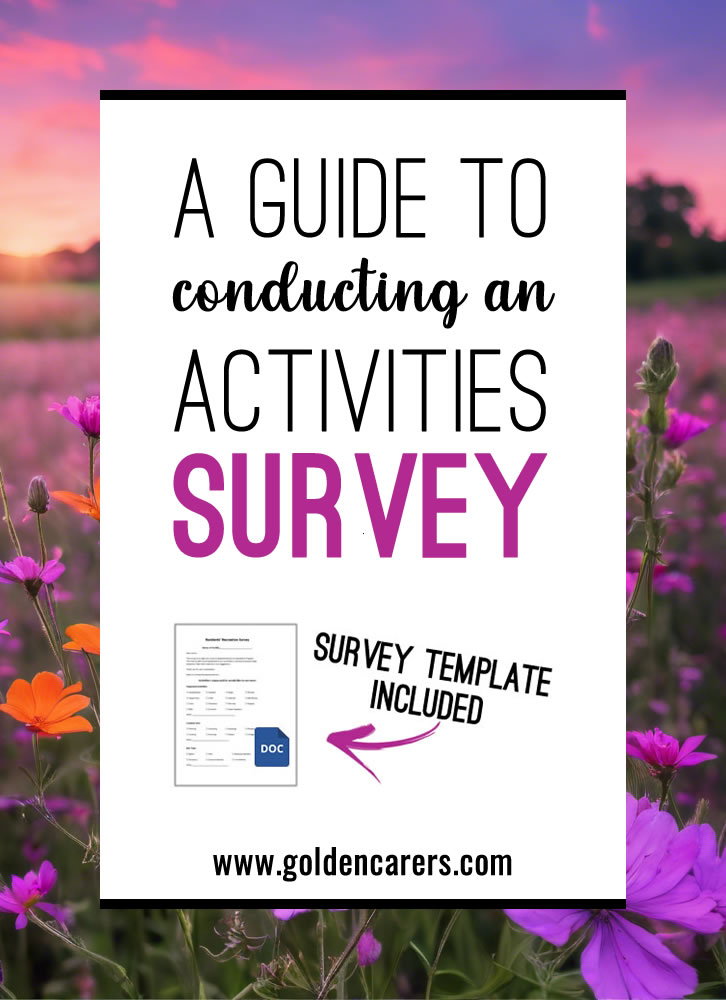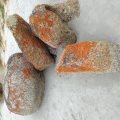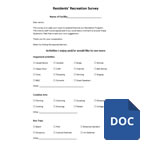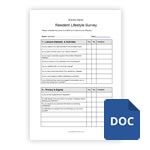
Golden Carers has 1000s of activities and resources for senior care.
Activity programs are a cornerstone of quality care in long-term care homes. These programs offer opportunities for residents to connect, stay active, and enjoy fulfilling experiences each day.
For prospective residents and their families, the quality of an activities program is a key consideration, alongside the facility's environment, services, living spaces, and the well-being of current residents.
Addressing Lack of Engagement
One common challenge for Activity Coordinators is the lack of engagement among residents. This issue may stem from:
Habitual Participation: Some residents may attend activities out of routine rather than genuine interest.
Social Gathering: Residents may congregate in recreation areas simply because it's a social hub, not necessarily because they are enthusiastic about the activities.
Boredom: A lack of interest in current activities, even if residents don’t openly express dissatisfaction.
Activity Imbalance: Overemphasis on certain types of activities can lead to a decline in interest in others.
Lack of Enthusiasm: Insufficient energy or passion from staff leading the activities.
Behavioral Factors: Conditions like apathy impacting participation.
The Power of Surveys
Conducting regular surveys is an effective way to address engagement challenges and tailor your activities program to residents' preferences. To assist with this, we’ve included two printable survey templates in Word format:
Activity Program Survey: A concise tool for gathering quick feedback on current programs.
Resident Lifestyle Survey: A detailed questionnaire exploring various aspects of residents' interests, histories, and preferences.
These surveys are ready for customization and easy distribution, helping you gather meaningful insights to improve your activities program.
Tips for Optimizing Your Survey Process
Self-Reflection: Review your current activities before creating the survey to ensure alignment with resident needs.
Resident Involvement: Encourage residents to participate. Family members can assist if needed.
Survey Distribution: Use multiple channels, such as printed forms, online submissions, or facility newsletters.
Anonymity: Offer the option to respond anonymously for honest feedback.
Feedback Analysis: Look for patterns and actionable insights in the survey results.
Action Plan: Develop and implement a strategy based on the feedback. Include new activities and adjustments to reflect residents’ preferences.
Continuous Improvement: Repeat the survey process regularly and adapt programs accordingly.
Resident Input is Key
Engaging residents in shaping their activity programs is one of the most effective ways to create a vibrant and fulfilling environment. Surveys provide a direct line to their needs and preferences, empowering you to make informed decisions that improve their quality of life.
Have you conducted a survey before? If so, what insights did you gather, and how did it impact your program? If not, there’s no better time to start. A small effort today can lead to a big transformation in how your activities program resonates with your residents.
Print Downloads:
Related Activities
Comments Post a Comment
Antoinette
Not many people have participated in events so this survey will be a great help to get their input.
Thank you.

 28th Apr 2022
Activity Director
28th Apr 2022
Activity Director
Have you thought about having a resident council meeting where Activities they want to do the primary topic
Giving them a choice of two or three items usually is good
You are so may want to do one to one especially with the student not usually participate
Here are some ideas how to get residence to participate
https://www.goldencarers.com/search/?search_tag=Forum&search=Reluctant%20residence


 7th Apr 2021
Activity Director
7th Apr 2021
Activity Director
It is a good idea to do the survey before starting activities to see what your residents are thinking
 7th Apr 2021
Director Of Activities
7th Apr 2021
Director Of Activities

 24th Mar 2021
Activity Director
24th Mar 2021
Activity Director
Thank you for your kind words
 29th Mar 2021
29th Mar 2021


 18th Feb 2020
Activity Director
18th Feb 2020
Activity Director
Here is an activity evaluation form
https://www.goldencarers.com/activity-evaluation-form/5165/
This is a wonderful tool!
Thank you,
Brenda
 26th Aug 2019
Recreation Therapist
26th Aug 2019
Recreation Therapist
Thank in advance

 27th Aug 2019
Activity Director
27th Aug 2019
Activity Director
Ask about what they enjoyed about planning the trip
The bus ride or transportation over there to the park
Their favorite activities at the park
The fun they had with their friends
Did they meet new friends
Did they have anything to eat what was their favorite
Did they see any children
What did they think the children were doing and what did the children have fun doing
I am sure if you think about the trip and each part of it that you can figure out more questions to ask if this is not enough
Let me know if you need more help
Thanks..
 12th Aug 2019
12th Aug 2019
 12th Mar 2019
Senior Ministry Director
12th Mar 2019
Senior Ministry Director
 17th Mar 2019
17th Mar 2019
You can open the word document and make any changes you require and then save it as a pdf document. (File > Save As > and then select type 'pdf').
Let me know if you have any questions!
Thanks so much! Karen in Sitka, Alaska
 8th Oct 2018
8th Oct 2018

 22nd Aug 2018
Activities Director
22nd Aug 2018
Activities Director
 26th Aug 2018
26th Aug 2018
 3rd Aug 2017
Activities
3rd Aug 2017
Activities
we are in the process of preparing our annual survey of our respite clients and their carers and these templates have generated further thinking and provided lots more ideas and options.
Much appreciated!
 23rd Jul 2017
23rd Jul 2017
 3rd May 2017
Care
3rd May 2017
Care
Can someone show me how to record an activity session
Ger

 29th Mar 2017
Life Style Officer
29th Mar 2017
Life Style Officer
Thank you
 3rd Apr 2017
3rd Apr 2017
 29th Dec 2016
Recreational activity officer
29th Dec 2016
Recreational activity officer
 1st Jan 2017
1st Jan 2017

 1st Oct 2016
Recreation Director
1st Oct 2016
Recreation Director
 3rd Oct 2016
3rd Oct 2016

 23rd Aug 2016
23rd Aug 2016

 22nd Aug 2016
Student
22nd Aug 2016
Student

 16th Aug 2016
Recreation and Rehab Manager
16th Aug 2016
Recreation and Rehab Manager
 23rd Aug 2016
23rd Aug 2016
 16th Aug 2016
Activities Coordinator
16th Aug 2016
Activities Coordinator
 16th Aug 2016
16th Aug 2016
 16th Aug 2016
Lifestyle
16th Aug 2016
Lifestyle
 16th Aug 2016
16th Aug 2016
 18th Feb 2017
recreation
18th Feb 2017
recreation
Could I get a copy of your annual survey for residents? And yes I would include the lifestyle survey it is very good!




 How to Help New Residents Adjust to Lifestyle Changes
How to Help New Residents Adjust to Lifestyle Changes
 10 Ways Technology is Improving Assisted Living
10 Ways Technology is Improving Assisted Living
 How to Plan & Implement an Induction & Orientation Program
How to Plan & Implement an Induction & Orientation Program
 How to Manage Wandering in Dementia Care
How to Manage Wandering in Dementia Care


Can be difficult to get everyone involved
It is great that you are thinking of all your residents
First you need to know what the residents like to do and what they are capable of doing
I like to do one to one within a group or a mixed group
This article will be a big help to you
https://www.goldencarers.com/how-to-support-mentally-alert-clients-in-mixed-group-environments/4992/
I also like music activities for a mixed group
https://www.goldencarers.com/music/
Here are some more things to try
ave you tried these
https://www.goldencarers.com/dementia/
https://www.goldencarers.com/reminiscing-activities-for-seniors/3184/
https://www.goldencarers.com/sensory-stimulation-for-dementia-care/4184/
https://www.goldencarers.com/20-practical-activities-for-people-living-with-alzheimers-disease/3778/
If so, do you need help adapting and modifying them to your particular group?
Here are some other ideas
I always had one to one interactions within a group activity. With such a diverse group, it is hard to have everyone participate unless you
walk around the group making eye contact so you get each person's attention
address each person by name
have an activity that most everyone can participate in like a sing along
but what I usually do is play name that tune and here is how
After the group is assembled, make sure to greet everyone. Tell your audience how happy you are that they are there. Greet each person by name. Remember you need to be enthusiastic about what you are doing
Now you are ready to start the activity
Instead of playing one or two notes or playing the game like hangman, (You could play these ways as well), you say the first word of the song title. See if anyone can finish the title. If not, say the second word of the title and so on until someone gets the title. If they are having a hard time, give other hints. To allow the meek resident a chance, ask the other members in the group to give the meek person a chance to name the song. Even if someone else shouts out the title, still ask the shy individual to say the title of the song. Be extremely complimentary to this person, as well, to boost his/her confidence.
After the song title is guessed, ask, who can sing it. Sometimes we only sing the first line. Sometimes we butcher the song, but then we have a good laugh.
Continue playing the game in this manner, singing the familiar songs, or singing them with a CD, for the allotted time period. I usually do it for about an hour
Throw in a little trivia if there is a lull in the action. For example, if the song is about summer, I ask the participants to tell me their favorite season and why they like that season. I always tell the story of how I hate winter.
If they are nonverbal, you can say the answer for them. However before saying the title, say, I can tell by (name of participant)’s smile that she thinks the title is (whatever the song title is). or you can ask a higher functioning resident what he thinks the non verbal resident is thinking
Then you might want to gently squeeze this person’s hand or give him/her a hug
I just go with the flow. Thus, the group is different every time.
Another good game is a dice game called one
We have played a similar game using just one die.
Each person gets a turn rolling the die until he gets a one or chooses to stop
We add up the numbers rolled each person gets
If you want to have a winner, the one with the most points at the end of the round wins.
What is so good about this game is, that it is good for a group with mixed mental and physical abilities. You can have some group members help other group members.
It is great as a long or short activity